Understanding Advanced Filtration with Industrial Filter Paper
In the demanding landscape of modern manufacturing and industrial operations, precise and efficient filtration is not merely an option but a critical necessity. The integrity of processes, the quality of end products, and compliance with environmental regulations hinge significantly on effective filtration solutions. At the forefront of this vital function is industrial filter paper, a highly specialized filtration medium engineered to meet the stringent demands of various sectors, including chemical processing, metalworking, food and beverage, pharmaceuticals, and environmental management. Unlike general-purpose filtration media, industrial filter paper is designed with specific technical parameters, such as precise pore size distribution, superior wet strength, chemical compatibility, and thermal stability, to address complex industrial challenges. It plays a pivotal role in contaminant removal, fluid clarification, and particle separation, directly impacting operational efficiency, equipment longevity, and the purity of process streams. The meticulous design and manufacturing of this paper ensure that it can withstand harsh operating conditions while maintaining optimal filtration performance, thereby contributing significantly to cost savings through reduced downtime and improved product quality.
The selection of the appropriate industrial filter paper is a highly technical decision, often requiring a deep understanding of the fluid characteristics, particle sizes to be removed, operating temperature and pressure, and the chemical composition of the fluid being filtered. Leading industrial filter paper manufacturers leverage advanced material science and manufacturing techniques to produce a diverse range of products, each tailored for specific applications. For instance, filter papers used in metalworking coolants require high flow rates and robust particle retention, while those in pharmaceutical applications demand exceptional purity and integrity to prevent contamination. The ongoing advancements in filter paper technology focus on enhancing filtration efficiency, increasing service life, and improving sustainability through the use of eco-friendly materials and processes. This continuous innovation ensures that industries can achieve increasingly higher standards of fluid cleanliness, optimize their processes, and meet evolving regulatory requirements. Ultimately, investing in high-quality industrial filter paper translates directly into enhanced process reliability, reduced operational costs, and superior product outcomes.
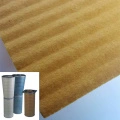
The Advanced Manufacturing Process of Industrial Filter Paper
The production of high-performance industrial filter paper is a sophisticated multi-stage process that begins with the careful selection of raw materials. Typically, this involves high-grade cellulose fibers, often sourced from wood pulp or cotton linters, which provide the primary filtration matrix. For specialized applications, synthetic fibers such as polyester, polypropylene, or fiberglass may be incorporated to enhance properties like chemical resistance, thermal stability, or mechanical strength. The manufacturing process typically involves pulping the raw fibers, where they are mechanically or chemically separated and refined into a uniform slurry. This slurry is then fed onto a specialized paper machine, similar to those used in traditional paper manufacturing, but with precise control over sheet formation to achieve specific pore structures and basis weights. Advanced techniques, such as wet-laid nonwoven processes, are often employed to ensure uniform fiber distribution and consistent porosity, which are crucial for reliable filtration performance. The sheet then undergoes pressing and drying stages, often with calendering or embossing steps, to achieve desired thickness, smoothness, and permeability.
Throughout the manufacturing cycle, stringent quality control measures are implemented to ensure the final product meets exacting standards. This includes continuous monitoring of fiber dispersion, sheet formation consistency, basis weight, and thickness. Post-processing, the industrial filter paper undergoes a series of critical tests. These include testing for micron retention ratings, which measure the smallest particle size the paper can effectively capture, often ranging from sub-micron levels to several hundred microns. Other vital parameters tested are permeability (airflow or liquid flow rate through the paper), wet bursting strength (resistance to tearing or rupturing when saturated), tensile strength, and chemical compatibility. Adherence to international standards like ISO 16889 (for hydraulic filter elements), ISO 2942 (for filter media compatibility), or industry-specific standards such as those required for food contact or pharmaceutical applications, is paramount. The average service life of industrial filter paper varies significantly based on application, contaminant load, and operating conditions, typically ranging from a few days to several weeks in continuous operations. Its applicability spans diverse industries: in petrochemicals for separating oil from water, in metallurgy for filtering cutting fluids and quenching oils, and in water treatment for removing suspended solids from industrial effluents, significantly contributing to cleaner processes and environmental compliance by offering superior particle capture and extending equipment life compared to conventional methods.
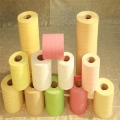
Technical Specifications and Performance Metrics
The performance of industrial filter paper is quantified by a range of technical parameters that are crucial for selecting the correct media for a given application. These specifications define the paper’s physical properties, filtration efficiency, and operational limits. Understanding these metrics is vital for engineers and procurement specialists to ensure optimal process performance and cost-effectiveness. Key parameters include: Micron Rating, which indicates the nominal or absolute particle size the paper can remove; Basis Weight (GSM or lbs/ream), representing the mass per unit area, influencing thickness and strength; Thickness (mils or mm), affecting flow rate and dirt holding capacity; Porosity, the volume of void space within the paper, impacting flow and particle capture; Wet Strength, the paper’s ability to resist tearing when saturated, crucial for liquid filtration; and Permeability, the rate at which fluid can pass through the paper under specific pressure. Chemical compatibility and maximum operating temperature are also critical considerations to ensure the paper does not degrade or react with the process fluid.
Below is a typical table illustrating common parameters for various types of industrial filter paper. These values are generalized, as specific formulations from different industrial filter paper manufacturers will vary. This data serves as a guide for initial selection and comparison, highlighting the diverse capabilities available in the market to address specific industrial filtration needs, from coarse pre-filtration to fine polishing.
Typical Industrial Filter Paper Specifications
| Parameter | Unit | Fine Filtration (e.g., Oil Mist) | Medium Filtration (e.g., Coolant) | Coarse Filtration (e.g., Sludge) |
|---|---|---|---|---|
| Micron Rating (Nominal) | µm | 0.5 – 5 | 10 – 50 | 50 – 200 |
| Basis Weight | g/m² | 80 – 150 | 60 – 120 | 40 – 80 |
| Thickness | mm | 0.25 – 0.50 | 0.18 – 0.35 | 0.10 – 0.20 |
| Permeability (Air @ 125 Pa) | L/min/m² | < 500 | 500 – 2000 | > 2000 |
| Wet Burst Strength | kPa | > 150 | > 100 | > 50 |
| Max. Operating Temp. | °C | 80 – 150 | 70 – 120 | 60 – 100 |

Diverse Applications and Strategic Advantages
The versatility of industrial filter paper makes it an indispensable component across a broad spectrum of industrial applications, delivering tangible benefits that range from enhanced product quality to significant operational cost savings. In the metalworking industry, for example, it is extensively used for filtering grinding, honing, and cutting oils and coolants. By effectively removing metallic particles, swarf, and tramp oil, the filter paper ensures the longevity of machinery, improves the finish of machined parts, and extends the life of expensive coolants, leading to reduced fluid replacement costs and disposal burdens. In the petrochemical sector, specialized grades of industrial filter paper are employed in catalyst recovery, oil-water separation, and pre-filtration for reverse osmosis systems, ensuring the purity of feedstocks and effluents. For the food and beverage industry, high-purity, FDA-compliant filter papers are crucial for clarifying edible oils, fruit juices, and brewing processes, directly impacting taste, appearance, and shelf life of consumer products. Its ability to capture fine particulates while maintaining high flow rates makes it ideal for these sensitive applications.
Beyond these specific examples, the strategic advantages of employing high-quality industrial filter paper are multifaceted. Firstly, it ensures superior fluid cleanliness, which is paramount for protecting downstream equipment, preventing nozzle clogging, and preserving the integrity of finished products. Secondly, the controlled porosity and material compatibility contribute to increased operational efficiency by reducing equipment wear and tear, minimizing unscheduled downtime for maintenance, and optimizing process flow. Thirdly, the use of effective filtration media often leads to significant cost savings. This is achieved through extended fluid life, reduced disposal volumes, and the prevention of product spoilage or rework. Many industrial filter paper suppliers now offer products with enhanced dirt-holding capacities, leading to longer filter change-out intervals and further reducing labor and material costs. Furthermore, in an era of heightened environmental consciousness, the proper selection of filter paper can aid industries in meeting increasingly stringent discharge regulations by effectively removing pollutants from waste streams, demonstrating a commitment to sustainability and responsible operations. These robust advantages underscore why industrial filter paper remains a foundational element in advanced industrial filtration strategies.
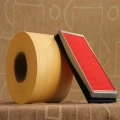
Strategic Manufacturer Selection and Customization Capabilities
Selecting the right industrial filter paper manufacturers or suppliers is a critical decision that impacts not only the technical performance of filtration systems but also operational efficiency and long-term cost-effectiveness. A reputable manufacturer will demonstrate deep expertise in material science and filtration technology, offering a diverse product portfolio tailored to specific industry needs. Key indicators of a reliable supplier include ISO 9001 certification, illustrating a commitment to quality management systems, and a track record of successful partnerships with leading industrial companies. Furthermore, experienced industrial filter paper suppliers often provide comprehensive technical support, assisting clients with filter media selection, system optimization, and troubleshooting, ensuring that the chosen solution performs optimally under unique operational conditions. For example, a global leader in automotive component manufacturing recently faced challenges with coolant contamination leading to frequent tool changes. By collaborating with a certified filter paper manufacturer, they implemented a new paper grade specifically designed for high-pressure coolant filtration, resulting in a 30% reduction in tool wear and a 15% increase in coolant life, validated through rigorous onsite testing and performance monitoring.
Beyond standard offerings, the capability for customization is a significant differentiator among industrial filter paper manufacturers. Many industrial processes have unique requirements that cannot be met by off-the-shelf products. Customization options typically include: tailored micron ratings to achieve specific particle removal efficiencies; adjustments in wet strength or chemical resistance for compatibility with aggressive fluids; variations in roll width, length, or sheet size to fit existing filtration equipment perfectly; and integration of specialized treatments such as anti-fungal agents or fire retardants. For instance, a major chemical plant required a filter paper that could withstand highly corrosive acids at elevated temperatures. Through close collaboration, our team developed a synthetic fiber-reinforced industrial filter paper with a proprietary chemical treatment, which not only met the stringent chemical compatibility requirements but also extended the filter service life by over 50% compared to previous solutions. This bespoke approach ensures maximum efficiency and cost savings, underscoring the value of partnering with manufacturers who can deliver precise, engineered solutions rather than generic products, ultimately building stronger trust through demonstrated problem-solving capabilities and tailored excellence.
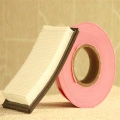
Ensuring Trust: Quality Assurance, Delivery, and Support
Trust is the bedrock of any B2B relationship, particularly when dealing with mission-critical components like industrial filter paper. Reputable industrial filter paper suppliers and manufacturers uphold the highest standards of quality assurance, ensuring every roll or sheet delivered meets or exceeds the stipulated specifications. This commitment to quality typically begins with rigorous raw material inspection, followed by in-process quality checks at every stage of manufacturing, and culminating in comprehensive final product testing. Certifications such as ISO 9001 are foundational, demonstrating a robust quality management system. Furthermore, many suppliers will provide detailed Certificates of Analysis (CoA) with each batch, verifying key performance parameters like micron rating, basis weight, and wet strength. This meticulous attention to detail not only guarantees product consistency but also provides clients with the necessary documentation for their own internal quality audits and regulatory compliance. Our company, with over 15 years of dedicated service in industrial filtration, has built its reputation on unwavering commitment to product excellence and transparent quality control, earning the trust of global clients.
Beyond product quality, the efficiency and reliability of delivery and after-sales support are paramount. A dependable supply chain, optimized for global logistics, ensures timely delivery to minimize operational disruptions for clients. Transparent communication regarding lead times, shipping status, and potential delays is crucial. Our standard delivery cycle for stock items is typically 3-5 business days domestically and 7-14 days internationally, with expedited options available for urgent requirements. We also offer comprehensive warranty commitments, typically guaranteeing product performance against manufacturing defects for a specified period or usage volume, underscoring our confidence in our products. Post-purchase, readily available customer support is vital for addressing any queries, offering technical guidance, or assisting with order management. This includes dedicated technical sales engineers, readily available through various communication channels, to provide expert advice and troubleshoot filtration challenges. Our commitment extends to providing detailed product guides, safety data sheets, and training on optimal product usage to maximize client success, fostering long-term partnerships built on reliability and mutual trust.
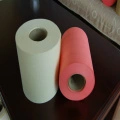
Frequently Asked Questions (FAQ) about Industrial Filter Paper
Q1: How do I determine the correct micron rating for my application?
A1: Selecting the appropriate micron rating for industrial filter paper depends on several factors: the size of the particles you need to remove, the desired clarity of the filtrate, and the permissible pressure drop across the filter. For very fine particulate removal, such as in pharmaceutical or high-precision metalworking applications, lower micron ratings (e.g., 0.5-5 μm) are necessary. For general clarification or removal of larger suspended solids, higher micron ratings (e.g., 50-200 μm) may suffice. It’s crucial to analyze the particle size distribution in your fluid and consult with experienced industrial filter paper suppliers who can recommend the optimal micron rating based on your specific process requirements, flow rates, and desired end-product quality. Often, laboratory analysis of fluid samples is recommended to precisely identify the particulate load and characteristics, informing the best filter paper choice.
Q2: Can industrial filter paper be reused or recycled?
A2: Generally, once industrial filter paper has reached its dirt-holding capacity and becomes clogged, it is disposed of. The feasibility of reuse or recycling largely depends on the type of contaminants captured and the paper’s material composition. If the paper has filtered non-hazardous, biodegradable substances, it might be compostable or suitable for certain waste-to-energy processes. However, if it contains hazardous materials like heavy metals, chemicals, or pathogenic organisms, it must be handled and disposed of as hazardous waste in accordance with local environmental regulations. While some advanced filter media are designed for backwashing or regeneration, most traditional industrial filter paper is single-use. Sustainable manufacturing practices are increasingly focusing on developing filter papers from recycled content or easily biodegradable materials to minimize environmental impact, representing an ongoing trend among progressive industrial filter paper manufacturers.
Q3: What are the key factors influencing the service life of industrial filter paper?
A3: The service life of industrial filter paper is influenced by several critical factors. Primarily, the concentration and type of contaminants in the fluid play a significant role; higher particulate loads will naturally clog the paper faster. The flow rate and pressure differential across the filter are also crucial, as excessive flow or pressure can prematurely blind the media or even cause structural failure. Chemical compatibility between the filter paper and the process fluid is paramount; corrosive or reactive fluids can degrade the paper’s integrity. Temperature also affects service life, as elevated temperatures can weaken the paper’s structure or alter its filtration characteristics. Lastly, the chosen micron rating and the paper’s dirt-holding capacity directly impact how much contaminant it can retain before requiring replacement. Regular monitoring of pressure drop across the filter is a common method to determine when the industrial filter paper needs replacement, indicating it has reached its optimal service endpoint.
Conclusion: The Future of Industrial Filtration
The continuous evolution of industrial filter paper technology is poised to address the increasingly complex filtration challenges faced by modern industries. As industries strive for higher purity standards, greater operational efficiency, and enhanced sustainability, the demand for advanced, customized filtration solutions will only grow. Innovations in materials science, particularly the development of synthetic-fiber blends, composite media, and biodegradable options, are expanding the capabilities of filter paper to handle more aggressive chemicals, higher temperatures, and finer particle separation. Furthermore, the integration of smart manufacturing techniques and real-time monitoring systems is enabling filter paper to become a more intelligent component within filtration systems, allowing for predictive maintenance and optimized replacement schedules. The role of leading industrial filter paper manufacturers and industrial filter paper suppliers will be critical in driving these advancements, ensuring that industries worldwide have access to the most effective and sustainable filtration media available.
Investing in high-quality industrial filter paper is not merely a procurement decision but a strategic investment in the longevity of equipment, the quality of products, and the environmental integrity of operations. By understanding the intricate manufacturing processes, technical specifications, and diverse applications of this essential filtration medium, industrial stakeholders can make informed choices that yield significant dividends in performance and profitability. The collaborative efforts between end-users and expert manufacturers will continue to push the boundaries of what is possible in industrial filtration, paving the way for cleaner, more efficient, and more sustainable industrial processes globally.
References
- Filtration & Separation Journal. “Advances in Filter Media for Industrial Applications.” Volume 58, Issue 3, 2021.
- International Organization for Standardization (ISO). “ISO 16889: Hydraulic fluid power – Filters – Multi-pass method for evaluating filtration performance of a filter element.” 2008.
- American National Standards Institute (ANSI). “ANSI/AWWA B100-16: Granular Activated Carbon.” 2016.
- Journal of Membrane Science. “Pore Structure Characterization of Cellulose-Based Filter Media.” Volume 625, 2021.
- Environmental Science & Technology. “Microplastic Removal by Industrial Filtration Systems.” Volume 55, Issue 18, 2021.
Hebei Fangyu Filter Material Technology Co.,Ltd is the leading innovative developer and manufacturer all kinds of filter materials in China.pocket filter media factory Located in the economically developed Handan Hebei specialized in various kinds of filter materials from Synthetic Media,Paint stop Filter Media Pre- filter Non Woven Fabric ,Wire Mesh Backed Laminated Filter Media,Ceiling filter Auto Cabin Filter Media, polypropylene filter media, Glass Microfiber Filter Media Nonwoven Fabric,Pre- filter non woven fabric, activated carbon filter materials, EN779 bag filter materials, HEPA filter media, air filter HEPA filter media and Filter Accessories.Our filter materials have passed ISO9001:2000 quality certification since 2005.Certified by ISO9001, UL2 and SGS, with emphasis on quality and service. Our strength is the ability to find innovative ways to meet marketplace or product requirements.activated filter media price|super blog